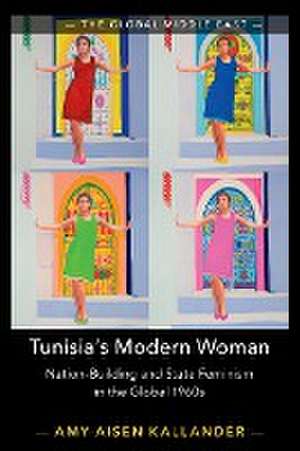Tunisia's Modern Woman: The Global Middle East
Autor Amy Aisen Kallanderen Limba Engleză Paperback – 18 ian 2024
| Toate formatele și edițiile | Preț | Express |
|---|---|---|
| Paperback (1) | 205.03 lei 6-8 săpt. | |
| Cambridge University Press – 18 ian 2024 | 205.03 lei 6-8 săpt. | |
| Hardback (1) | 584.24 lei 6-8 săpt. | |
| Cambridge University Press – 2 iun 2021 | 584.24 lei 6-8 săpt. |
Din seria The Global Middle East
-
 Preț: 153.39 lei
Preț: 153.39 lei -
 Preț: 209.78 lei
Preț: 209.78 lei -
 Preț: 238.40 lei
Preț: 238.40 lei -
 Preț: 231.82 lei
Preț: 231.82 lei -
 Preț: 202.82 lei
Preț: 202.82 lei -
 Preț: 178.53 lei
Preț: 178.53 lei -
 Preț: 247.76 lei
Preț: 247.76 lei -
 Preț: 237.96 lei
Preț: 237.96 lei -
 Preț: 186.61 lei
Preț: 186.61 lei -
 Preț: 231.09 lei
Preț: 231.09 lei -
 Preț: 270.07 lei
Preț: 270.07 lei -
 Preț: 193.71 lei
Preț: 193.71 lei -
 Preț: 356.91 lei
Preț: 356.91 lei -
 Preț: 203.50 lei
Preț: 203.50 lei - 11%
 Preț: 583.56 lei
Preț: 583.56 lei - 11%
 Preț: 640.30 lei
Preț: 640.30 lei -
 Preț: 283.03 lei
Preț: 283.03 lei - 11%
 Preț: 638.22 lei
Preț: 638.22 lei -
 Preț: 221.32 lei
Preț: 221.32 lei -
 Preț: 246.61 lei
Preț: 246.61 lei - 11%
 Preț: 705.53 lei
Preț: 705.53 lei - 11%
 Preț: 638.56 lei
Preț: 638.56 lei - 5%
 Preț: 805.74 lei
Preț: 805.74 lei -
 Preț: 286.85 lei
Preț: 286.85 lei -
 Preț: 321.52 lei
Preț: 321.52 lei -
 Preț: 322.04 lei
Preț: 322.04 lei
Preț: 205.03 lei
Nou
Puncte Express: 308
Preț estimativ în valută:
39.23€ • 40.96$ • 32.47£
39.23€ • 40.96$ • 32.47£
Carte tipărită la comandă
Livrare economică 04-18 aprilie
Preluare comenzi: 021 569.72.76
Specificații
ISBN-13: 9781108959490
ISBN-10: 1108959490
Pagini: 298
Dimensiuni: 152 x 229 x 16 mm
Greutate: 0.4 kg
Editura: Cambridge University Press
Seria The Global Middle East
ISBN-10: 1108959490
Pagini: 298
Dimensiuni: 152 x 229 x 16 mm
Greutate: 0.4 kg
Editura: Cambridge University Press
Seria The Global Middle East
Cuprins
Introduction; 1. Between State Feminism and Global Sisterhood; 2. Family Planning as Development: Urban Women, Rural Families, and Reproductive Justice; 3. Postcolonial Tunisian Academics: Between International Aid, National Imperatives, and Local Knowledge; 4. Fashion, Consumption, and Modern Gender Roles; 5. Love and Sex: The Limits of Modern Womanhood and Heterosexual Masculinity; Conclusion: Love, Politics, and Bread.
Recenzii
'Amy Kallander's study is essential reading for those working to understand the lasting effects of 20th state feminism projects in the Middle East and North Africa. With careful research that includes key Tunisian periodicals and memoirs to supplement archival research, Kallander presents us also with a clear sense of Tunisian women's agency in navigating both national and international pressure to conform to particular formulations of modern womanhood. The analysis Kallander provides of the Tunisian experience offers a compelling basis for re-evaluating the contemporaneous experiences of women elsewhere in the region.' Camron Amin, University of Michigan
'By questioning our preconceived ideas about state feminism and by recovering the instrumental roles of female activists in postcolonial Tunisia, this book is a must-read and a milestone for the studies of gender relationships in the Arab world.' M'hamed Oualdi, The Paris Institute of Political Studies
'Amy Kallander compellingly locates debates about women's political rights, economic roles, dress and family planning in 1960s Tunisia within their global, national and local conditions of production. Eloquently exploring the intersection of discourses with the heterogeneity of women's lives, this book will be key reading for students and scholars of women and gender history and the Global 1960s in North Africa and the Middle East, and beyond.' Natalya Vince, University of Portsmouth
'Recommended.' A. Rassam, Choice Connect
'By questioning our preconceived ideas about state feminism and by recovering the instrumental roles of female activists in postcolonial Tunisia, this book is a must-read and a milestone for the studies of gender relationships in the Arab world.' M'hamed Oualdi, The Paris Institute of Political Studies
'Amy Kallander compellingly locates debates about women's political rights, economic roles, dress and family planning in 1960s Tunisia within their global, national and local conditions of production. Eloquently exploring the intersection of discourses with the heterogeneity of women's lives, this book will be key reading for students and scholars of women and gender history and the Global 1960s in North Africa and the Middle East, and beyond.' Natalya Vince, University of Portsmouth
'Recommended.' A. Rassam, Choice Connect
